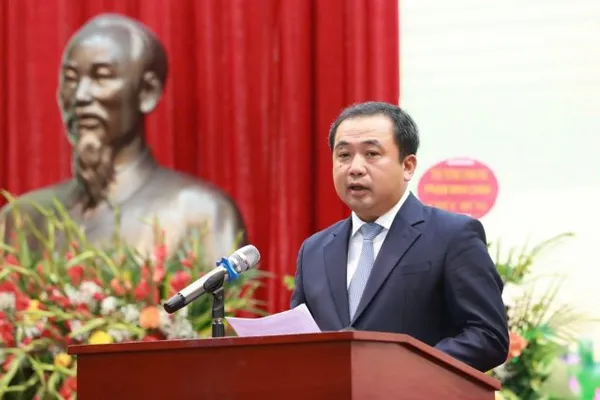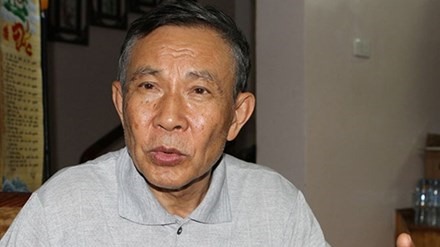 Opinion
Opinion

Former Chairman of the Party Central Committee’s Commission for Inspection Vũ Quốc Hùng tells the Tiền Phong (Vanguard) newspaper that a culture of self-respect and taking responsibility for one’s actions needs to be promoted.
 |
| Vũ Quốc Hùng |
Former Chairman of the Party Central Committee’s Commission for Inspection Vũ Quốc Hùng tells the Tiền Phong (Vanguard) newspaper that a culture of self-respect and taking responsibility for one’s actions needs to be promoted.
Prime Minister Nguyễn Xuân Phúc recently asked the Ministry of Home Affairs to formulate regulations that create conditions for officials and leaders to resign from their positions. Is this an urgent task? Why?
The so-called “culture of stepping down” was a hot topic at recent National Assembly and Government meetings. It has also been covered by many newspapers. I think these discussions show that it is something that should happen now.
We need to tap public opinion and raise social awareness of this step. Some people should have to resign immediately for their wrongdoings, violations, or lack of capacity. However, it should also be recognised that there are some people who act out of self-respect, honesty and repentance when they step down from their positions.
So it is necessary to raise awareness and understanding that there are situations when people have to be forced to quit, and where the act of resigning is honourable. If this realisation is deep, the act of stepping down will even be welcomed and encouraged by friends and relatives. This would develop a culture of taking responsibility for one’s actions.
There have been many instances of people resigning from their posts in the history of our country. But we’ve not had this happen in recent years, and now, we are talking about regulations to make it happen. Why?
There are still cases of people resigning from their positions in the current time. For example, former Party Committee Secretary Nguyễn Sự of Hội An City in Quảng Nam Province resigned last year. And in the latest case, Director of the Department of Natural Resources and Environment in Bà Rịa-Vũng Tàu Province, Lê Thị Công, has resigned.
There are different contexts to the act of resigning. There are those who quit very soon after taking up a position. There are voluntary resignations and those that are forced.
Officials who are entrusted by people to hold certain positions should show their strong will power and judge for themselves if they are fit for a position or not. And when the public or your organisation requires you to resign, you should do it. However, this happens rarely. It is not the norm.
I feel we should focus on the humanitarian aspect of stepping down. If someone resigns in national interest, depending on their job and positions, people will remember him or her with respect. A resignation can also help one’s comrades. If people, either out of fear or regard for someone, fail to denounce someone’s wrongdoings, the violations will continue.
In formulating regulations for people to step down, it is essential to maintain clarity of purpose. It should be based on a sense of responsibility to the nation. And as I said earlier, a distinction should be drawn between resignation as an act of honour, and one that is forced. Those who resign in order to abdicate responsibility should be condemned. Furthermore, resigning cannot mean that you are absolved of your wrongdoing.
Considering some recent, key cases of violations of the Resolution on Party Building adopted at the fourth plenum of the 12th Party Central Committee, what can be done in the coming time?
Both Party members and the general public found that the Resolution comprehensively reviews and defines orientations, and sets out solutions for implementation. For instance, handling all issues relating to the case of Trịnh Xuân Thanh, a member of the Hậu Giang provincial Party Committee, is a concrete expression of the Resolution. Thanh, Chairman of PetroVietnam Construction Corporation (PVC) from 2007-2013, had been negligent and lax in managing the corporation, resulting in many violations of the law on business management and a loss of more than VNĐ3.2 trillion (US$142 million) to the State exchequer. Thanh, who was also Vice Chairman of the People’s Committee of the Mekong Delta province of Hậu Giang from 2011-2016, was found abusing his privilege by using an official plate on his luxury Lexus car.
It is necessary to continue considering the responsibility of the Party Central Committee’s Organisation Commission and the Ministry of Home Affairs, and draw conclusions. The Government Inspectorate is yet to come up with an idea on processing this issue. The Government urged the Government Inspectorate to step in and investigating agencies were also involved, but no result was announced. We need to deal with the right person and the exact wrongdoing. During this process, it is good if someone proactively admits his wrongdoing and asks to resign. This does not mean that he will not have to take responsibility, but it should be taken as a mitigating factor.
The Resolution clearly points out all kinds of wrongdoings, and we need to review and deal with all of them. The Resolution is a microscope, now we need eyes. We have good microscope but without good eyes, we cannot see what it reveals. — VNS




